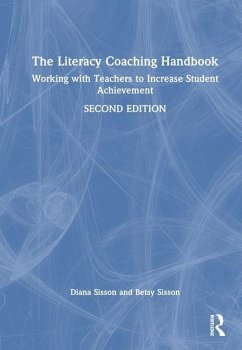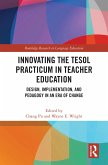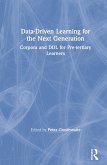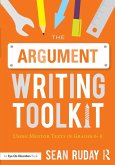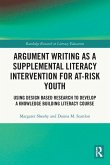Diana Sisson, Betsy Sisson
The Literacy Coaching Handbook
Working With Teachers to Increase Student Achievement
Diana Sisson, Betsy Sisson
The Literacy Coaching Handbook
Working With Teachers to Increase Student Achievement
- Gebundenes Buch
- Merkliste
- Auf die Merkliste
- Bewerten Bewerten
- Teilen
- Produkt teilen
- Produkterinnerung
- Produkterinnerung
Learn how to become a more effective literacy coach to ensure lasting changes in teaching and learning at your school. In this second edition, literacy experts Diana and Betsy Sisson offer clear, research-based strategies that encourage professional development and growth.
Andere Kunden interessierten sich auch für
![Teaching Literacy Effectively in the Modern Classroom for Ages 5-8 Teaching Literacy Effectively in the Modern Classroom for Ages 5-8]() Sue DymockTeaching Literacy Effectively in the Modern Classroom for Ages 5-8187,99 €
Sue DymockTeaching Literacy Effectively in the Modern Classroom for Ages 5-8187,99 €![Innovating the TESOL Practicum in Teacher Education Innovating the TESOL Practicum in Teacher Education]() Innovating the TESOL Practicum in Teacher Education198,99 €
Innovating the TESOL Practicum in Teacher Education198,99 €![The Writing Workshop Teacher's Guide to Multimodal Composition (6-12) The Writing Workshop Teacher's Guide to Multimodal Composition (6-12)]() Angela StockmanThe Writing Workshop Teacher's Guide to Multimodal Composition (6-12)197,99 €
Angela StockmanThe Writing Workshop Teacher's Guide to Multimodal Composition (6-12)197,99 €![Data-Driven Learning for the Next Generation Data-Driven Learning for the Next Generation]() Data-Driven Learning for the Next Generation198,99 €
Data-Driven Learning for the Next Generation198,99 €![The Antiracist English Language Arts Classroom The Antiracist English Language Arts Classroom]() Keisha RembertThe Antiracist English Language Arts Classroom199,99 €
Keisha RembertThe Antiracist English Language Arts Classroom199,99 €![The Argument Writing Toolkit The Argument Writing Toolkit]() Sean RudayThe Argument Writing Toolkit35,99 €
Sean RudayThe Argument Writing Toolkit35,99 €![Argument Writing as a Supplemental Literacy Intervention for At-Risk Youth Argument Writing as a Supplemental Literacy Intervention for At-Risk Youth]() Margaret SheehyArgument Writing as a Supplemental Literacy Intervention for At-Risk Youth62,99 €
Margaret SheehyArgument Writing as a Supplemental Literacy Intervention for At-Risk Youth62,99 €-
-
-
Learn how to become a more effective literacy coach to ensure lasting changes in teaching and learning at your school. In this second edition, literacy experts Diana and Betsy Sisson offer clear, research-based strategies that encourage professional development and growth.
Hinweis: Dieser Artikel kann nur an eine deutsche Lieferadresse ausgeliefert werden.
Hinweis: Dieser Artikel kann nur an eine deutsche Lieferadresse ausgeliefert werden.
Produktdetails
- Produktdetails
- Verlag: Routledge
- 2. Auflage
- Seitenzahl: 206
- Erscheinungstermin: 8. Dezember 2023
- Englisch
- Abmessung: 260mm x 183mm x 16mm
- Gewicht: 592g
- ISBN-13: 9781032528885
- ISBN-10: 1032528885
- Artikelnr.: 68714570
- Herstellerkennzeichnung
- Libri GmbH
- Europaallee 1
- 36244 Bad Hersfeld
- gpsr@libri.de
- Verlag: Routledge
- 2. Auflage
- Seitenzahl: 206
- Erscheinungstermin: 8. Dezember 2023
- Englisch
- Abmessung: 260mm x 183mm x 16mm
- Gewicht: 592g
- ISBN-13: 9781032528885
- ISBN-10: 1032528885
- Artikelnr.: 68714570
- Herstellerkennzeichnung
- Libri GmbH
- Europaallee 1
- 36244 Bad Hersfeld
- gpsr@libri.de
Diana Sisson and Betsy Sisson are international literacy consultants focusing on professional development and school improvement. They also serve as adjunct professors in the fields of teacher preparation, curriculum and instruction, educational research in literacy, and literacy instruction
Preface
Introduction
PART I How Important Is Coaching for Teaching and Learning?
1 The Evolution of Coaching as a Professional Development Model
Coaching Emerges as a Model of Professional Development
How Coaching Supports Effective Professional Learning
2 Models of Coaching
Peer Coaching
Cognitive Coaching
Instructional Coaching
Content Coaching
PART II What Roles Does a Literacy Coach Play?
3 Change Agent
How Is a Literacy Coach a Change Agent?
Why Is the Administrator Critical in Change Efforts?
What Teachers Are the Focus for Change?
How Does Change Happen?
4 Relationship Builder
How Important Is It to Build Relationships With Administrators?
Why Are Relationships With Classroom Teachers So Crucial?
How Do Literacy Coaches Build Relationships With Classroom Teachers?
In What Ways Can Relationships Be Leveraged to Counter Resistant Teachers?
5 Data Analyst
Why Must Data Analysis Begin With the Administrator?
Why Is Looking at Data With Teachers So Critical?
What Types of Data Should Be Examined?
Demographic Data
Student Learning Data
Behavioral Data
How Can Literacy Coaches Help Teachers Analyze Data?
How Does the Use of Data Drive Coaching?
6 Curriculum Expert
How Does Working With the Administrator on Curriculum Benefit the Whole
School?
What Exactly Is Curriculum and Why Must Literacy Coaches Be Curriculum
Experts?
How Can the Role of Curriculum Expert Transform Teaching and Learning?
7 Resource Manager
Why Does Collaborating With the Administrator Assure a Comprehensive
Allocation of Resources?
How Do Resource Managers Build a School Collection?
What Kinds of Resources Are Important?
8 Instructional Specialist
Why Is It Critical to Create an Instructional Leadership Team With the
Administrator?
How Important Is the Role of Instructional Specialist?
What Does an Instructional Specialist Do?
How Does an Instructional Specialist Employ Strategies Prescriptively?
9 Professional Developer
Why Does Teaming Up With the Administrator Transform Professional Learning?
How Significant Is Professional Development?
In What Ways Do Adults Learn and How Does This Influence Professional
Development?
How Is a Focus for Professional Development Identified?
What Forms Can Professional Learning Take?
Faculty Workshops
Team Meetings
Classroom Visitations
Teacher Study Groups
Observation and Feedback Loop
Modeling
Co-Planning
Co-Teaching
Lesson Study
Looking at Student Work
Examining Achievement Data
Coaching Cycles
How Can Multimodal Coaching Strengthen Professional Learning Experiences?
Virtual Workshops
Online Professional Book Clubs
Digital Literacy Resources
Internet Collaboration Tools
Classroom Videos
Webcam Technology
How Can Coaching Be Equitable for All Teachers?
Coaching Rotations for All Faculty Members
Teacher-Requested Consultancy
Administrator-Requested Consultancy
How Can Literacy Coaches Ensure High-Quality Professional Development?
By What Means Can Coaches Provide Support in Schools Experiencing Faculty
Shortages?
What About Working With Students?
PART III How Does a Coach Ensure Lasting Change?
10 Building Essential Skills for Successful Literacy Coaching
Just How Important Are Reading Credentials to a Literacy Coach?
In What Ways Can Literacy Coaches Continue to Build Their Own Skill Sets?
How Can Change Be Sustained?
Why Is Self-Reflection Essential for Sustaining Change?
Final Thoughts
References
Appendix A: Coaching Moves Rating Scale
Appendix B: Professional Developer Resources
Appendix C: Professional Book Club - Questions for Study and Reflection
Introduction
PART I How Important Is Coaching for Teaching and Learning?
1 The Evolution of Coaching as a Professional Development Model
Coaching Emerges as a Model of Professional Development
How Coaching Supports Effective Professional Learning
2 Models of Coaching
Peer Coaching
Cognitive Coaching
Instructional Coaching
Content Coaching
PART II What Roles Does a Literacy Coach Play?
3 Change Agent
How Is a Literacy Coach a Change Agent?
Why Is the Administrator Critical in Change Efforts?
What Teachers Are the Focus for Change?
How Does Change Happen?
4 Relationship Builder
How Important Is It to Build Relationships With Administrators?
Why Are Relationships With Classroom Teachers So Crucial?
How Do Literacy Coaches Build Relationships With Classroom Teachers?
In What Ways Can Relationships Be Leveraged to Counter Resistant Teachers?
5 Data Analyst
Why Must Data Analysis Begin With the Administrator?
Why Is Looking at Data With Teachers So Critical?
What Types of Data Should Be Examined?
Demographic Data
Student Learning Data
Behavioral Data
How Can Literacy Coaches Help Teachers Analyze Data?
How Does the Use of Data Drive Coaching?
6 Curriculum Expert
How Does Working With the Administrator on Curriculum Benefit the Whole
School?
What Exactly Is Curriculum and Why Must Literacy Coaches Be Curriculum
Experts?
How Can the Role of Curriculum Expert Transform Teaching and Learning?
7 Resource Manager
Why Does Collaborating With the Administrator Assure a Comprehensive
Allocation of Resources?
How Do Resource Managers Build a School Collection?
What Kinds of Resources Are Important?
8 Instructional Specialist
Why Is It Critical to Create an Instructional Leadership Team With the
Administrator?
How Important Is the Role of Instructional Specialist?
What Does an Instructional Specialist Do?
How Does an Instructional Specialist Employ Strategies Prescriptively?
9 Professional Developer
Why Does Teaming Up With the Administrator Transform Professional Learning?
How Significant Is Professional Development?
In What Ways Do Adults Learn and How Does This Influence Professional
Development?
How Is a Focus for Professional Development Identified?
What Forms Can Professional Learning Take?
Faculty Workshops
Team Meetings
Classroom Visitations
Teacher Study Groups
Observation and Feedback Loop
Modeling
Co-Planning
Co-Teaching
Lesson Study
Looking at Student Work
Examining Achievement Data
Coaching Cycles
How Can Multimodal Coaching Strengthen Professional Learning Experiences?
Virtual Workshops
Online Professional Book Clubs
Digital Literacy Resources
Internet Collaboration Tools
Classroom Videos
Webcam Technology
How Can Coaching Be Equitable for All Teachers?
Coaching Rotations for All Faculty Members
Teacher-Requested Consultancy
Administrator-Requested Consultancy
How Can Literacy Coaches Ensure High-Quality Professional Development?
By What Means Can Coaches Provide Support in Schools Experiencing Faculty
Shortages?
What About Working With Students?
PART III How Does a Coach Ensure Lasting Change?
10 Building Essential Skills for Successful Literacy Coaching
Just How Important Are Reading Credentials to a Literacy Coach?
In What Ways Can Literacy Coaches Continue to Build Their Own Skill Sets?
How Can Change Be Sustained?
Why Is Self-Reflection Essential for Sustaining Change?
Final Thoughts
References
Appendix A: Coaching Moves Rating Scale
Appendix B: Professional Developer Resources
Appendix C: Professional Book Club - Questions for Study and Reflection
Preface
Introduction
PART I How Important Is Coaching for Teaching and Learning?
1 The Evolution of Coaching as a Professional Development Model
Coaching Emerges as a Model of Professional Development
How Coaching Supports Effective Professional Learning
2 Models of Coaching
Peer Coaching
Cognitive Coaching
Instructional Coaching
Content Coaching
PART II What Roles Does a Literacy Coach Play?
3 Change Agent
How Is a Literacy Coach a Change Agent?
Why Is the Administrator Critical in Change Efforts?
What Teachers Are the Focus for Change?
How Does Change Happen?
4 Relationship Builder
How Important Is It to Build Relationships With Administrators?
Why Are Relationships With Classroom Teachers So Crucial?
How Do Literacy Coaches Build Relationships With Classroom Teachers?
In What Ways Can Relationships Be Leveraged to Counter Resistant Teachers?
5 Data Analyst
Why Must Data Analysis Begin With the Administrator?
Why Is Looking at Data With Teachers So Critical?
What Types of Data Should Be Examined?
Demographic Data
Student Learning Data
Behavioral Data
How Can Literacy Coaches Help Teachers Analyze Data?
How Does the Use of Data Drive Coaching?
6 Curriculum Expert
How Does Working With the Administrator on Curriculum Benefit the Whole
School?
What Exactly Is Curriculum and Why Must Literacy Coaches Be Curriculum
Experts?
How Can the Role of Curriculum Expert Transform Teaching and Learning?
7 Resource Manager
Why Does Collaborating With the Administrator Assure a Comprehensive
Allocation of Resources?
How Do Resource Managers Build a School Collection?
What Kinds of Resources Are Important?
8 Instructional Specialist
Why Is It Critical to Create an Instructional Leadership Team With the
Administrator?
How Important Is the Role of Instructional Specialist?
What Does an Instructional Specialist Do?
How Does an Instructional Specialist Employ Strategies Prescriptively?
9 Professional Developer
Why Does Teaming Up With the Administrator Transform Professional Learning?
How Significant Is Professional Development?
In What Ways Do Adults Learn and How Does This Influence Professional
Development?
How Is a Focus for Professional Development Identified?
What Forms Can Professional Learning Take?
Faculty Workshops
Team Meetings
Classroom Visitations
Teacher Study Groups
Observation and Feedback Loop
Modeling
Co-Planning
Co-Teaching
Lesson Study
Looking at Student Work
Examining Achievement Data
Coaching Cycles
How Can Multimodal Coaching Strengthen Professional Learning Experiences?
Virtual Workshops
Online Professional Book Clubs
Digital Literacy Resources
Internet Collaboration Tools
Classroom Videos
Webcam Technology
How Can Coaching Be Equitable for All Teachers?
Coaching Rotations for All Faculty Members
Teacher-Requested Consultancy
Administrator-Requested Consultancy
How Can Literacy Coaches Ensure High-Quality Professional Development?
By What Means Can Coaches Provide Support in Schools Experiencing Faculty
Shortages?
What About Working With Students?
PART III How Does a Coach Ensure Lasting Change?
10 Building Essential Skills for Successful Literacy Coaching
Just How Important Are Reading Credentials to a Literacy Coach?
In What Ways Can Literacy Coaches Continue to Build Their Own Skill Sets?
How Can Change Be Sustained?
Why Is Self-Reflection Essential for Sustaining Change?
Final Thoughts
References
Appendix A: Coaching Moves Rating Scale
Appendix B: Professional Developer Resources
Appendix C: Professional Book Club - Questions for Study and Reflection
Introduction
PART I How Important Is Coaching for Teaching and Learning?
1 The Evolution of Coaching as a Professional Development Model
Coaching Emerges as a Model of Professional Development
How Coaching Supports Effective Professional Learning
2 Models of Coaching
Peer Coaching
Cognitive Coaching
Instructional Coaching
Content Coaching
PART II What Roles Does a Literacy Coach Play?
3 Change Agent
How Is a Literacy Coach a Change Agent?
Why Is the Administrator Critical in Change Efforts?
What Teachers Are the Focus for Change?
How Does Change Happen?
4 Relationship Builder
How Important Is It to Build Relationships With Administrators?
Why Are Relationships With Classroom Teachers So Crucial?
How Do Literacy Coaches Build Relationships With Classroom Teachers?
In What Ways Can Relationships Be Leveraged to Counter Resistant Teachers?
5 Data Analyst
Why Must Data Analysis Begin With the Administrator?
Why Is Looking at Data With Teachers So Critical?
What Types of Data Should Be Examined?
Demographic Data
Student Learning Data
Behavioral Data
How Can Literacy Coaches Help Teachers Analyze Data?
How Does the Use of Data Drive Coaching?
6 Curriculum Expert
How Does Working With the Administrator on Curriculum Benefit the Whole
School?
What Exactly Is Curriculum and Why Must Literacy Coaches Be Curriculum
Experts?
How Can the Role of Curriculum Expert Transform Teaching and Learning?
7 Resource Manager
Why Does Collaborating With the Administrator Assure a Comprehensive
Allocation of Resources?
How Do Resource Managers Build a School Collection?
What Kinds of Resources Are Important?
8 Instructional Specialist
Why Is It Critical to Create an Instructional Leadership Team With the
Administrator?
How Important Is the Role of Instructional Specialist?
What Does an Instructional Specialist Do?
How Does an Instructional Specialist Employ Strategies Prescriptively?
9 Professional Developer
Why Does Teaming Up With the Administrator Transform Professional Learning?
How Significant Is Professional Development?
In What Ways Do Adults Learn and How Does This Influence Professional
Development?
How Is a Focus for Professional Development Identified?
What Forms Can Professional Learning Take?
Faculty Workshops
Team Meetings
Classroom Visitations
Teacher Study Groups
Observation and Feedback Loop
Modeling
Co-Planning
Co-Teaching
Lesson Study
Looking at Student Work
Examining Achievement Data
Coaching Cycles
How Can Multimodal Coaching Strengthen Professional Learning Experiences?
Virtual Workshops
Online Professional Book Clubs
Digital Literacy Resources
Internet Collaboration Tools
Classroom Videos
Webcam Technology
How Can Coaching Be Equitable for All Teachers?
Coaching Rotations for All Faculty Members
Teacher-Requested Consultancy
Administrator-Requested Consultancy
How Can Literacy Coaches Ensure High-Quality Professional Development?
By What Means Can Coaches Provide Support in Schools Experiencing Faculty
Shortages?
What About Working With Students?
PART III How Does a Coach Ensure Lasting Change?
10 Building Essential Skills for Successful Literacy Coaching
Just How Important Are Reading Credentials to a Literacy Coach?
In What Ways Can Literacy Coaches Continue to Build Their Own Skill Sets?
How Can Change Be Sustained?
Why Is Self-Reflection Essential for Sustaining Change?
Final Thoughts
References
Appendix A: Coaching Moves Rating Scale
Appendix B: Professional Developer Resources
Appendix C: Professional Book Club - Questions for Study and Reflection

